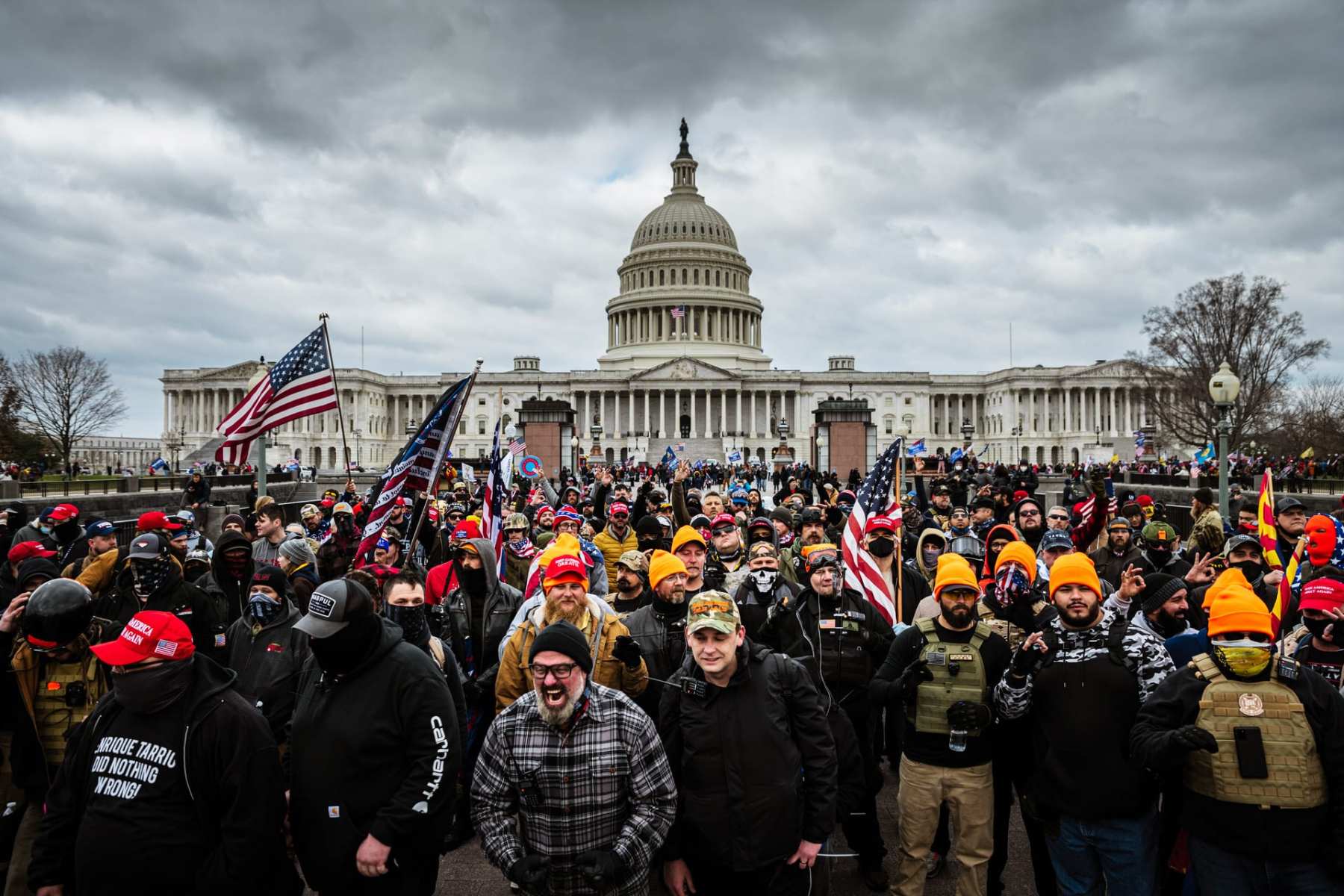Donald Trump’s White House presidency ended as it started, with his noxious interpretation of masculinity — and his equally pernicious understanding of femininity — front and center.
In the final weeks of the 2016 campaign, a tape surfaced of Trump bragging about sexual assault, saying that “when you’re a star” you can “grab ’em by the pussy, you can do anything.” Within a few weeks, more than a dozen women had accused the real estate developer of various forms of sexual harassment and assault. He was elected anyway. The day after his inauguration, a crowd roughly three times the size of his gathered in the same spot as part of the largest single-day protest in U.S. history. They carried signs to reclaim his comment: “This pussy grabs back!”
Nearly four years later, as Congress met to certify Trump’s loss to Joe Biden in the 2020 election, Trump, in a last-ditch effort to pressure Mike Pence to execute a spurious plan to overturn its valid outcome, told his vice president as he headed to the U.S. Capitol that he had a choice: “You can either go down in history as a patriot … or you can go down in history as a pussy,” Trump said, according to the New York Times. He then falsely told a crowd of his supporters that Pence had the power to stop the certification before directing them to the Capitol, where they ransacked offices and desecrated official areas of the building chanting, “Hang Mike Pence!” as he sheltered in place. Even still, in a chain of tweets hours later, Trump wrote that Pence did not have the “courage” to carry out his plan.
Trump’s evocation of the vagina, first to objectify and subjugate women, then to insult his top lieutenant, are bookends on a presidency that was marked by his adherence to an amped-up version of hegemonic masculinity, which researchers define as a cultural ideal that prioritizes the dominance of White, cisgender, heterosexual men and traits such as strength and power, over women, LGBTQ+ people, those with disabilities, racial minorities and traits such as cooperativeness and kindness.
This version of hegemonic masculinity — and Trump’s apparent preoccupation with it — manifested throughout his presidency. His administration curtailed access to contraception and rolled back protections for LGBTQ+ individuals. He presided over the COVID-19 pandemic that resulted in the first recession to disproportionately affect women even as he mocked Biden for wearing masks, rejected the safety precaution as unmanly and contracted the coronavirus.
During his 2016 campaign, Trump previewed how he would wield hegemonic masculinity as a weapon once in office by repeatedly questioning his rivals’ strength or using stereotypically feminine characteristics to insult them. Trump, who avoided serving in the military himself, questioned whether Sen. John McCain, a former prisoner of war, was a hero. In one debate, he mocked Sen. Marco Rubio’s application of makeup and called him a “nervous basket case” who perspired too much. In another, Trump and Rubio sparred over the size of Trump’s hands as a stand-in for his genitalia, which the president has repeatedly, and incorrectly, equated to his masculinity. Both McCain and Rubio, either indirectly or overtly, threatened Trump’s comprehension of his own manhood. Both provoked a response.
Trump’s backers support him because of, not in spite of, this hyped-up version of hegemonic masculinity, new research shows. It follows that the most fervent among them closed out his presidency by heeding his call to descend on the Capitol in a synthetic testosterone-fueled mob of mostly White men to protest Trump’s loss to one of the many opponents whose masculinity he mocked.
“Everything he says and does is about masculinity,” said Theresa Vescio, a professor of psychology and women’s, gender and sexuality studies at Penn State University.
Vescio’s research shows that after affiliation with a political party, an individual’s embracement of hegemonic masculinity is the strongest predictor for supporting Trump, more so than someone’s gender, race or level of education.
Once in office, Trump continued to use gendered insults, often attacking women’s appearances or intellectual prowess. He called aide Omarosa Manigault Newman, one of the few Black women to serve in the Trump White House, a “crazed, crying lowlife” and a “dog” when she left, alleging the president had used racial slurs. He inexplicably claimed Rep. Nancy Pelosi’s teeth were “falling out of her mouth” as the chamber moved to impeach him. He called British Prime Minister Theresa May a “fool” and German Chancellor Angela Merkel “stupid.”
While criticizing democratically elected leaders of traditional U.S. allies, many of whom were women, Trump embraced authoritarian leaders, all of whom were men, weakening global alliances and leaving the country’s stature diminished overseas.
After a meeting with Russia’s Vladimir Putin, Trump exalted him as “very, very strong” even though U.S. intelligence agencies had found the Kremlin had interfered in the 2016 election. Trump became the first U.S. president to meet with North Korea’s dictator, Kim Jong Un, after tweeting that his “nuclear button” was “much bigger and more powerful” than Kim’s, adding: “And my button works!” The remarks could have been interpreted as a challenge by Kim as he built up the country’s nuclear arsenal.
Trump’s use of masculinity as a compliment and cudgel at times weakened his position. His relationship with Putin and Russia’s effort in 2016 to get Trump elected, and ties between the campaign and the foreign power, cast a shadow over his presidency. In June, North Korea said its relationship with the United States was cooling after two unprecedented meetings between the two leaders because Trump was “hypocritical” and did not keep his promises. Trump’s praise for Turkey’s Recep Tayyip Erdogan, another authoritarian leader, prompted a rare rebuke from those in his own party, including Sen. Lindsey Graham, a steadfast supporter of the president.
Trump singled out a group of House lawmakers known as “the squad” — all four are women of color — in racist attacks, saying they should “go back and help fix the totally broken and crime infested places from which they came.” In his reelection campaign, Trump told women voters who bore the brunt of an economic recession that he would be “getting their husbands back to work” and suggested that housing desegregation had made suburban women unsafe, leaning into the version of hegemonic masculinity that prioritizes White power.
But it was two moments of domestic crisis during the last year of his presidency that cemented Trump’s application of this virulent strain of hegemonic masculinity as his legacy. Both led to violence against his own citizens:
First, when law enforcement officials were ordered to tear gas Black Lives Matter protesters in front of the White House to clear the way for Trump’s photo opportunity as he condemned the mostly peaceful nationwide movement for racial justice.
Then, when the outgoing president sicced thousands of his supporters on the building where members of Congress and his own vice president were meeting to certify the valid results of the 2020 election, exhorting the mob to “fight like hell.”
The insurrectionists ransacked the Capitol, known as the People’s House, as they waved Confederate flags, attacked police and roved the halls carrying the type of zip-ties law enforcement uses to detain suspects. Lawmakers from both parties feared for their lives. Democrats said some of their Republican colleagues aided the rioters; some Republicans refused to wear protective masks during the lockdown and several of their Democratic colleagues subsequently announced they were infected with the COVID-19 virus. Trump’s toxic masculinity had overrun the building’s ceremonial chambers and its innermost rooms.
In the hours after the attack, Trump still insisted that the election had been stolen from him and called the rioters “patriots.” Twitter locked the president’s account after he continued to make false claims about the election and incite violence before shutting it down altogether. The account of Trump’s presidential campaign went next, followed by those of some of his top aides.
People close to Trump tied his role in the attack and subsequent response to a counterproductive version of masculinity. John Kelly, Trump’s former chief of staff, said the president could not admit to making a mistake because his “manhood was at issue.” Fox News asked White House Press Secretary Hogan Gidley whether Trump was “emasculated” by losing his Twitter account, and Gidley responded that he is “most masculine person” to ever be president.
Trump is already the first president in U.S. history to be impeached twice by the House of Representatives. Speaker Pelosi, the first woman to hold that role, again presided over the expedited proceedings; the highest-ranking Republican to join Democrats last week was Rep. Liz Cheney of Wyoming, who is also the only woman in party leadership. Trump’s encouragement of those who attacked the Capitol could further erode his power if the Senate, in an unusual post-presidency effort, convicts him this time and blocks him from seeking reelection. Sen. Mitch McConnell, the highest-ranking Republican in that chamber, has indicated privately that he is open to it as a way to diminish Trump’s hold on the party.
Trump leaves the White House as he entered it: consumed by his idea about what it means to be a man. He is the first outgoing president in modern U.S. history to not attend the inauguration of his successor. While he finally admitted that he would not be sworn in for a second term this week, he never officially conceded. He lost his office, then his megaphone, and now potentially his political future, emasculated by his embrace of toxic masculinity.






